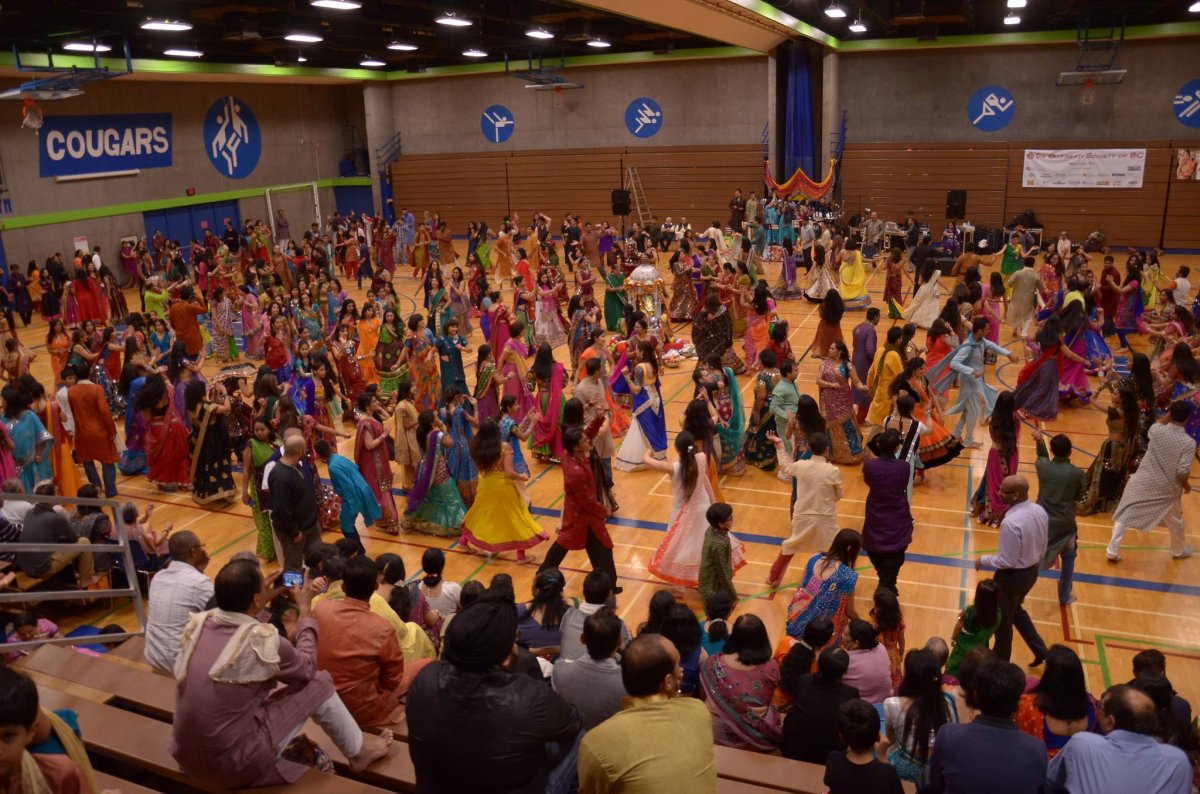You might not know it, but for more than 10,000 people in the Lower Mainland, the holiday season has already begun.

Hindu Canadians are celebrating one of their most important religious festivals of the year right now, Navratri.
While the festival is celebrated in different ways by people who originate from different parts of the South Asian subcontinent, it’s particularly important for people from the northwestern Indian state of Gujarat.
The Gujarati Society of B.C. is getting ready to host its celebrations this weekend.
“Navratri is actually a very fun event. It’s dancing and food and camaraderie and friendship among people,” said GSBC president Seema Kanji.
“It is one of the most important festivals for Gujaratis and so we’re trying to keep that tradition alive.”
The word “Navratri” translates to “nine nights” in the ancient Sanskrit language.
Fittingly, the festival is celebrated for nine nights each year, determined by the lunar calendar. This year, it runs from Sept. 29 to Oct. 7.
WATCH: Calgarians celebrate Diwali, the Hindu festival of lights

The beginning of Navratri also generally leads to preparations for the widely-celebrated festival of Diwali.
Navratri is also known as the festival of the Goddess, with each night celebrating a different avatar, or reincarnation, of the goddess Durga.
Traditionally, Gujaratis celebrate Navratri by coming together in the thousands for nine consecutive nights to socialize, and “play” with traditional folk dances.
One of those folk dance forms is called garba.
“It’s a folk dance from Gujarat, and it is done in a circular pattern around a garbhi, which is an altar that’s set up in the middle of a hall or a gym, or a school or wherever you’re having Navratri,” said Kanji.
“Basically people are honouring the goddess Durga, and seeking her blessings as they dance around the altar.”
Another dance, called dandiya raas, is played with partners who hit sticks together in repetitive movements — before moving on to the next person.
For someone who’s never seen it happening before, it would probably look like chaos — but somehow, every person dancing knows exactly what’s going on and what to do next.
That’s because Gujaratis grow up celebrating the festival, and playing with these dance forms every year.
Kanji’s five year old daughter Ayana will be one of those people who grows up learning the traditions of Gujarat, even here in Canada.
She says she’s been going to Navratri since she was three years old and loves it.
“I like going to garba and doing dandiya because it’s fun to do. I like getting dressed up because I look pretty,” said Ayana.

GSBC board member Priyanka Patel has also been going to Navratri since she was three — but she’s in her 20s now.
She was born and brought up in Canada, but her Gujarati heritage is an intrinsic part of her identity, and Navratri has played a big part in that.
“It’s an opportunity for us to firmly establish our own identity in the melting pot of identities that is not only Vancouver, but Canada in itself. Something that we can say, you know, this is our own,” said Patel.
Patel is a professional Bollywood dancer and teacher. But thanks to Navratri, Gujarati folk dances like garba and dandiya raas will always be her favourite styles to dance.
“When I hear the Gujarati music — that rhythm and those words, there’s something I just can’t verbally describe that I feel inside. Almost like my soul, which sounds kind of cliche, but really, it’s true,” said Patel.
“And I feel like this is me, this is my family, this is my heritage.”
While Ayana and Patel grew up with a thriving Gujarati community around them, and huge Navratri events to visit every year, it hasn’t always been like that in the Lower Mainland.
2019 marks 50 years of the Gujarati Society of B.C.
Back then, in 1969, it was a very different situation.
“Navratri actually started in the basement of one of our founding members, with just a handful of families, celebrating the event, and now it’s thousands of people who attend,” said Kanji.
Vancouver resident and Gujarati-Canadian Jyoti Chande has been around and a part of the GSBC community for 43 years.
When she and her husband moved here, there were only a few hundred attendees and everything was done and over by midnight every night. Now, young people want to stay out dancing until 2 or 3 a.m.
But Chande said that’s not necessarily a bad thing.
Chande said Gujaratis growing up here won’t get the same Navratri experience as they do in India, where the dancing happens without fail every night of the festival.
Here, life gets in the way.
“But at least they get the taste of it. And they know what our Gujarati culture is,” Chande said.
“And it’s not like, sit down and I’ll lecture you about what is our Gujarati culture; this is by seeing what they see. And they see their grandma, and they feel happy.”
Chande said she would love to see the festival grow even further — and wants anyone who’s interested in learning more to attend.
Kanji agrees.
“I think it’s important for other communities to get to know us,” she said.
“And so we would welcome all people to attend the event, get to know us, get to know what Gujarati people are about, and how we contribute to the Canadian fabric.”
Navratri may be a religious festival — but at the end of the day, Kanji said it’s a way for Gujarati Canadians to keep in touch with their heritage, with their culture, and with each other.
“It’s really a place where people can get together, pray together, dance together, eat and bond.”
Kanji expects about 5,000 people to attend this year, with tickets for Saturday night already sold out.
GSBC’s Navratri festival runs every evening this weekend at Johnston Heights Secondary School in Surrey.











Comments